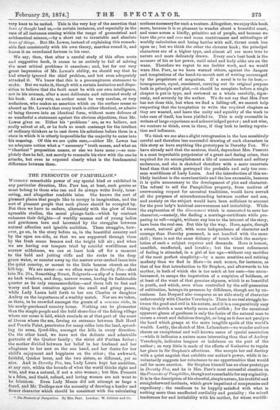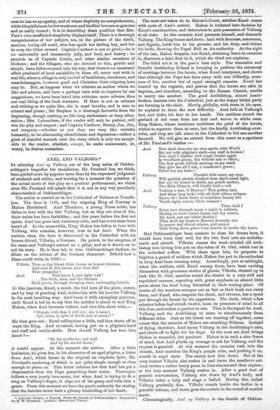THE PRESCOTTS OF PAMPHILLON.*
WITHOUT remarkable power of any special kind or exhibited in any particular direction, Mrs. Parr has, at least, such genius as must belong to those who can and do always write lively, inter- esting, and altogether readable tales. She knows the sort of pleasant places that people like to occupy in imagination, and the sort of pleasant people that such places should be occupied by. But then we have to endure, alternately with the glow of these agreeable studies, the moral plunge-bath—which by contrast enhances their delights—of worldly mamas and of young ladies and gentlemen torn and lacerated by the struggles between natural affection and ignoble ambition. These struggles, how- ever, go on, in the story before us, in the beautiful country and by the open sea-side, so that we are supported through them by the fresh ocean breezes and the bright hill air ; and when we are having our tempers tried by suicidal worldliness and narrow selfishness, we can at least look off for a moment to the bold and jutting cliffs and the rocks in the deep green water, or saunter away up the narrow over-arched lanes into the quiet country, or mount to the little beacon church on the hill-top. We are never—as we often were in Dorothy Fox—shut into No. 29.t, Something Street, Belgravia—a slip of a house with no back windows, and deep, narrow rooms, having its fashionable quarter as its only recommendation—and there left to fret and worry and beat ourselves against the small and grimy panes, while Lady Laura held forth to her son Charles or daughter Audrey on the importance of a wealthy match. Nor are we taken, as there, to be crowded amongst the guests of a nouveau riche, in his newly-purchased country house. Nothing can be pleasanter than the simple people and the bold shore-line of the fishing village where our scene is laid, which reminds us of that part of the coast of Devon where the sea, forcing an entrance between Bolt Head and Prawle Point, penetrates for many miles into the land, spread. ing its arms, fjord-like, amongst the hills in every direction. On the other hand, we have not the delicate and admirable portraits of the Quaker family ; the strict old Puritan father ; the mother divided between her belief in her husband and her allegiance to her sect on the one hand, and her desire for her child's enjoyment and happiness on the other ; the awkward, faithful, Quaker lover, and the two sisters, so different, yet so nice. And in Dorothy Fox, too, Lady Laura kept her ambition, at any rate, within the bounds of what the world thinks right and wise, and was a natural, if not a nice woman ; but Mrs. Prescott is a felon, and timid, refined, and loving women are not wont to be felonious. Even Lady Mason did not attempt so large a fraud, and Mr. Trollope saw the necessity of drawing a harder and firmer character which should be consistent with the calculating '1' The Preacotts of Pamphillon. By Mrs. Parr. London : W. Isbister and Co. coolness necessary for such a venture. Altogether, we enjoy this book more, because it is so pleasant to wander about a beautiful coast,. and come across a kindly, primitive set of people, and because we• have the pros and cons and mean contrivances and subterfuges of worldly calculation and losing battles with self, thrust much leas upon us ; but we think the other the cleverer book ; the principal characters are of a higher type, and almost all are more true to nature and more delicately drawn. Every one's beat book is the measure of his or her power, until mind and body alike are on the wane. Therefore we regret to see feebler work, and we would warn Mrs. Parr, as we have warned others, against the dangers and temptations of the hand-to-mouth sort of writing encouraged by the proprietors of magazines. If a novel is to be its best,— homogeneous, equal, consistent, carrying out its original purpose- both in principle and plot,—it should be complete before a single chapter is put in type, and reviewed as a whole carefully, rigor- ously, and severely by the author. We do not say that Mrs. Parr has not done this, but when we find a falling-off, we cannot help suspecting that the temptation to write the required chapters as they are wanted, and leave the unity and equality of the work to take care of itself, has been yielded to. This is only excusable in writers of large experience and acknowledged power ; and not wise, we venture to think, even in them, if they look to lasting reputa- tion and influence.
We think we see also a slight retrogression in the less sensitively careful and therefore less successful drawing of such characters in this story as have anything like prototypes in Dorothy Fox. We have already said that the anxious, timid, dependent Mrs. Prescott is a most improbable perpetrator of a great and daring crime, that required for its accomplishment a life of concealment and solitary endurance, and she is sketched therefore with a more uncertain hand than that which portrayed the probable and only too com- mon worldliness of Lady Laura. And the introduction of this un- likely incident is the more inartistic and the less excusable, because it is quite unnecessary to the development of plot and character. The refusal to sell the Pamphillon property, from motives of overweening respect for ancestral traditions, would have served all the purposes of misunderstanding between mother and son, and anxiety on the subject would have been sufficient to account for the poor lady's habitual care wornness and irritability. While the explanation of the denouement which is concocted to save her- character,—namely, the finding a marriage-certificate while pre- paring to sell—might, without any loss to the interest of the story, have been the real one. But this by the way. Hero, again, though a sweet, natural girl, with more independence of character and courage than Dorothy possessed, is not handled with the same skill ; there is not the same delicacy of touch which the manipu- lation of such a subject requires and demands. Hero is honest, unselfish, unaffected, and lovable ; but the truest refinement of feeling is attended, in a girl of her age—without any sacrifice of the most perfect simplicity—by a more sensitive and retiring modesty than we find in Hero—in such scenes, for instance, as that of her first introduction to Sir Stephen, and afterwards to his mother, in both of which she is too much at her ease—too unem- barrassed, to escape the imputation of a suspicion of boldness, or at least of the want of that genuine shyness, which is so beautiful in youth, and which, even when controlled by the self-possession of cultivation, betrays its presence by diffidence, though not by un- easiness. Leo Despard also compares as an able study of character unfavourably with Charles Verschoyle. There is no real struggle be- tween the good and evil in his nature, and it is a comparatively easy thing to sketch a man wholly mean and selfish ; for the occasional apparent gleam of goodness is only the desire of the natural man to secure a sweet and delicious draught, so long as it does not paralyse the hand which grasps at the more tangible spoils of this world's wealth. Lastly, the sketch of Mrs. Labouchere—we wonder authors choose an exceptional and well-known name of special association —while it indicates a nature more interesting than that of Audrey Verschoyle, indicates languor or indolence on the part of the author ; so very little is made of the efforts of Katherine to regain her place in Sir Stephen's affections. She accepts her sad destiny with a quiet anguish that exhibits our author's power, while it in- voluntarily suggests her reluctance to use opportunities that would call for more exertion. Sir Stephen himself has no clear prototype in Dorothy Fox, and he is Mrs. Parr's most successful creation in the Prescotts of Pamphillon, though not remarkable for any orginality. It is in the description of his cheerful, simple nature, his truthful and straightforward instincts, which grow impatient of compromise and expediency ; the readiness to be happily satisfied with what is nothing more than unaffected cordiality and geniality ; the mixed tenderness for and irritability with his mother, for whose worldli- mess he has no sympathy, and of whose duplicity no comprehension, while his pitifulness for her weakness and his filial love are so genuine and so easily roused ; it is in describing these qualities that Mrs. Parr's own unaffected simplicity displays itself. There is a thorough comprehension of her subject, too, in the picture of the timid, anxious, loving old maid, who has spoilt her darling boy, and has to reap the bitter reward. Captain Carthew is not so good,—he is too universally and incessantly jolly, and loud, and hearty ; he reminds us of Captain Cuttle, and other similar creations of Dickens ; and the villagers, who are devoted to him, gentle and simple, have fallen so much into his way, that there is an unnatural effect produced of level amiability in them all, never met with in real life, where a village is only too full of backbiters, slanderers, and scandalmongers, however good and Christian their reigning hero may be. But, as happens when we criticise an author whom we like and admire, and have a perhaps vain wish to improve by our suggestions, we have been lured into criticism more adverse than our real liking of the book warrants. If Hero is not so reticent and retiring as we quite like, she is most lovable, and is sure to attract and please ; Sir Stephen is a thorough favourite from the beginning, though exciting no life-long enthusiasm or deep admi- ration ; Mrs. Labouchere, if the reader will only be patient, will win his pity and respect ; and Captain Carthew, Betsey, Joe, Jim, and company—whether or not they are very like variable humanity, in its alternating cheerfulness and depression—reflect a glow of cheerful warmth over the story which is only too accept- able to the reader, whether, ennuye, he seeks amusement, or, weary, he desires recreation.



































 Previous page
Previous page